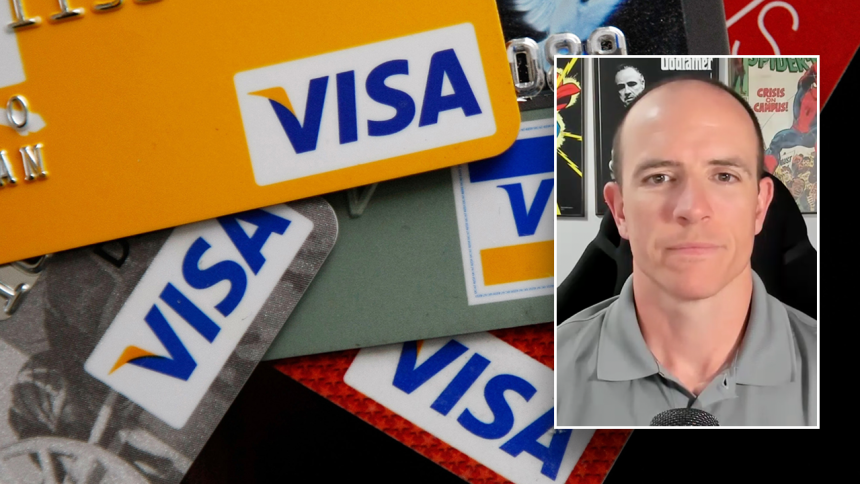Nearly every store has rewards credit cards available for customers, but not all the offers add up to major savings. These offers are often the “genesis” of long-term issues, one personal finance expert warns.
“There’s just a trickle effect that could last maybe years for that consumer,” financial planner and “What Should I Do With My Money?” author Bryan Kuderna told Fox News Digital.
“They’re like, oh, you know, I got 50 bucks off of buying that sofa that maybe I didn’t even really want in the first place, and then… you look at what that did to their financial plan. And it’s kind of amazing sometimes to see what the genesis of [what] some of these issues was.”
FINANCE EXPERT SOUNDS ALARM OVER ‘SPAVING’ TREND: AN OLD ‘TRAP’ WITH A NEW NAME HITTING YOUR WALLET
Store credit cards are similar to other “spaving” ploys from retailers designed to make consumers spend more to save. Unlike other deals, like buy one, get one sales, credit cards come with long-term financial risks.
Retailers offer consumers two card options – a store card only accepted at a certain retailer or family of brands and a co-branded card that can be used widely. The cards are primarily pitched to consumers at point-of-purchase rather than having to complete an application process or go to the bank.
The quick sales-pitch nature of the card pitch can “rope in” unsuspecting consumers and prompt a “trickle down” effect on their financial plans.
“A lot of people, they don’t intend to open up a new credit card today when they go to Costco or Walmart or even when they sign on to Amazon or whatever the case might be,” Kuderna explained. “Then they get that alert or the person at the register says, ‘hey, would you be interested in opening a store credit card? You can get all of today’s purchases half off.’ You know something that sounds like almost too good to be true, which usually does mean it’s too good to be true.”
GEN Z LEAN ON CREDIT MORE THAN MILLENNIALS DID AND RACKING UP MORE DEBT
Kuderna went on to explain the “severe” financial dangers of impulsively applying for retail credit cards.
“[The cards] might be attractive. They might rope us in. But if we cannot pay off that debt, and we’re stuck paying the interest or any late payment fees and so forth,” Kuderna stressed.
“With these kind of point of purchase offers, there’s not time for homework,” he added. “Some people just say, ‘I didn’t intend on opening a credit card, but now here I am. I opened a card and now what is that going to be in over the next two years for myself, my budget and my credit score.'”
Opening the card gives an initial hit to an individual’s credit score with a credit inquiry. Credit scores are critical to buying power and can help consumers save on payments and interest rates for big purchases like homes and vehicles.
After the initial credit inquiry, high interest rates, late payment fees and even inactivity clauses can bring recurring disasters for consumers.
“Oftentimes these type of cards have a low credit limit, which means as you use it, your utilization ratio looks very high, which is not good. And then, if we’re not using the card for a period of time, they may end up just closing the card on us, which then reduces our credit limit. Again, not good for our credit score,” Kuderna explained.
“What they may end up spending in interest on their store credit card or late payment fees or anything else could pale in comparison to that little savings that they got at one time when they opened the credit card.”
CREDIT CARD DEBT IS SURGING AS AVERAGE AMERICAN OWES $6,218
According to data from Bankrate, interest rates for retail credit cards have hit a new record high at 28.93% as of October 2023. Kuderna warned the high rates make it difficult for shoppers to maximize the card’s incentives and can lead to customers paying more in interest than they are making in savings.
“If you simply look at that math there, you could see how much in favor that is to the issuing company, the credit card company or the retail store.” – Bryan Kuderna
“The interest that they’re going to charge, the possible penalties that could be involved, the fine print on the card, the inactivity clauses, if you’re not using the card, there could be so many strings attached.”
Retail cards also often provide offers for young buyers and shoppers with poor credit to acquire a new credit card. Subprime lending, also called predatory lending, can be a great opportunity, but it is also an aspect which Kuderna says consumers should “be extremely careful” about.
The “spaving” offer also acts similar to a subscription model. If a retailer can “hook in” a customer with a store card, it can create a returning buyer and potentially increase profits for that retailer. It also means consumers must face “difficult choices” when it comes to finances.
“We’re doing all that for just this immediate gratification because of the intro offer. But again, the long-term effects here. We don’t notice them immediately, but they’re there. And then, as they compound with other department stores, other online retailers, that’s where people can really get in a mess without having intended to ever be there,” Kuderna explained.
While there are “severe” pitfalls to opening a retail card, Kuderna outlined that the credit cards could be “a win-win, but you really need to do some homework on that.”
For those looking to open a store card, Kuderna urged consumers to evaluate the kind of card they applied for and whether the particular retailer is a place one shops “frequently.” In addition, consumers who do apply for a card should practice paying off balances immediately.
Other tips include viewing the retail card like any conventional credit card, practicing good budgeting and remembering not to take on more debt than you are capable of paying off.
Read the full article here




